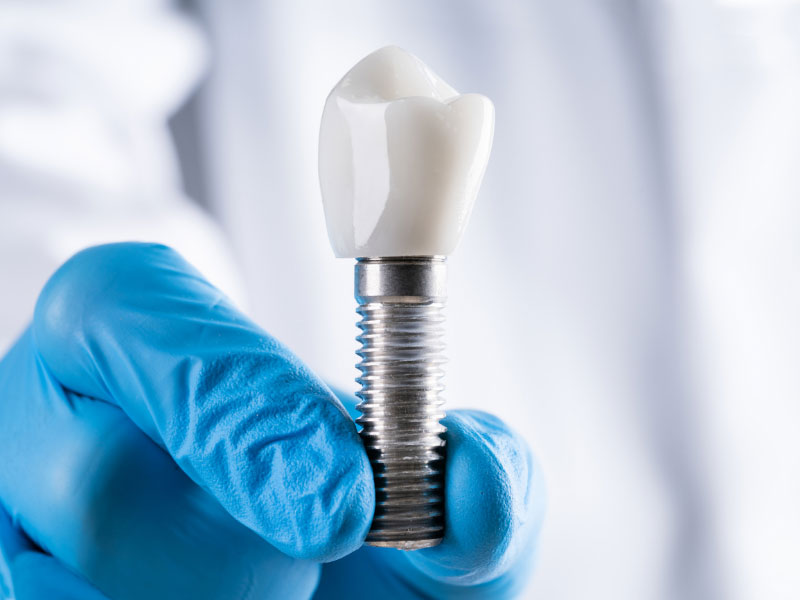The Appeal of a Single Tooth Dental Implant

Attaining a complete and healthy smile is not only essential for aesthetic appeal but also vital for oral health and overall well-being. However, various factors, such as tooth decay, accidents, or dental issues, can lead to the loss of teeth. In such instances, single-tooth dental implants have emerged as an incredibly appealing solution to restore a tooth's natural appearance and function.
Dental health plays a significant role in our daily lives, enabling proper chewing and speaking and contributing to self-confidence and social interactions. The loss of a tooth can have a considerable impact on oral health and quality of life. It can cause adjacent teeth to shift, resulting in misalignment, bite problems, or even jaw joint disorders.
This is where the significance of single-tooth dental implants comes into play. Dental implants offer a dependable and long-lasting solution that closely replicates the structure and function of a natural tooth. By comprehending the advantages of single-tooth dental implants, individuals can make informed decisions about their oral health and regain the smile they desire. In the next sections, we will examine the different factors that make single-tooth dental implants appealing.
Understanding Single-Tooth Dental Implants
Single-tooth dental implants are highly effective and popular solutions for replacing missing teeth. They consist of three primary components: the implant post, the abutment, and the crown. Let's examine each of these components more closely:
1. Implant Post: The implant post serves as the foundation of the dental implant. Typically made of titanium, a biocompatible material, it fuses with the jawbone through osseointegration. This creates a stable and durable anchor for the replacement tooth.
2. Abutment: The abutment is a connector piece that attaches to the implant post. It extends from the gum line and provides a secure attachment point for the dental crown. The abutment can be customized to ensure proper alignment and aesthetic appeal.
3. Crown: The crown is the visible part of the dental implant that closely resembles a natural tooth. The dental implant is created to perfectly match the shape, size, and color of the other teeth, resulting in a seamless and natural look. Typically crafted from durable materials such as ceramic or porcelain, the crown is resistant to staining and closely mimics the characteristics of natural teeth.
Advantages of Single Tooth Dental Implants
Single-tooth dental implants offer numerous advantages that contribute to oral health's aesthetic and functional aspects. Let's explore some of the key benefits:
- Natural Appearance: Dental implants have a similar shape, color, and overall appearance as natural teeth.
- Improved Smile: By filling the gap left by a missing tooth, implants enhance the overall symmetry and balance of the smile, resulting in a more pleasing and harmonious facial appearance.
- Improved Chewing Efficiency: Dental implants restore the ability to bite and chew with strength
The Process of Placing a Single-Tooth Dental Implant
Placing a single-tooth dental implant involves several stages, beginning with the first consultation and ending with the final restoration. Let's break down the steps involved in this process:
1. Initial Consultation: During your first visit, a dental professional will carefully evaluate your oral health and determine your eligibility for a dental implant. They will assess the condition of your teeth and gums, take X-rays or scans, and discuss your concerns and expectations.
2. Treatment Planning: The dentist will create a customized treatment plan tailored to your needs based on the evaluation. This plan will address the timeline of the procedure, potential costs, and any necessary preparatory procedures like tooth extraction or bone grafting.
3. Implant Placement: The implant placement procedure is usually performed with local anesthesia or conscious sedation to ensure comfort. The dentist will make a small incision in the gum tissue to expose the underlying jawbone. Then, a carefully sized space will be created in the bone to accommodate the implant.
4. Healing Period (Osseointegration): After the implant is placed, a healing period begins. During this time, osseointegration occurs, where the implant fuses with the surrounding jawbone. This process typically takes several months and is crucial for the implant to become fully integrated and stable. Sometimes, a temporary tooth replacement option may be provided to maintain aesthetics and functionality during this period.
5. Abutment Placement: Once osseointegration is completed, a minor surgical procedure will be performed to expose the implant and attach an abutment. The abutment serves as a connector between the implant and the final dental crown.
6. Final Restoration: Impressions of the abutment will be taken to create a custom-made dental crown that matches the color, size, and shape of your natural teeth. The dental crown is then securely attached to the abutment, completing the restoration process.
Evaluating Candidacy for Single-Tooth Dental Implants
Only some people are immediate candidates for single-tooth dental implants. Several factors are considered to determine an individual's suitability for the procedure. Here are the key factors and prerequisites:
1. Healthy Gums: Good oral health is crucial for successful implant placement. Healthy gums provide a stable foundation and support for the implant. If a patient has gum disease, it may need to be treated and resolved before implant placement.
2. Sufficient Bone Density: Dental implants require adequate bone density and volume for integration and stability. Insufficient bone may result from tooth loss, gum disease, or natural resorption over time. In such cases, bone grafting procedures may be necessary to augment the bone and create a suitable environment for implant placement.
3. Overall Health: An individual's general health is considered when evaluating their eligibility for dental implants. Conditions like uncontrolled diabetes, immune disorders, or certain medications may affect healing and increase the risk of complications. Collaboration between the dentist and the patient's healthcare provider is crucial in assessing the feasibility of implants in such cases.
4. Commitment to Oral Hygiene: Proper oral hygiene is vital for the long-term success of dental implants. Candidates for implants should be willing to commit to excellent oral hygiene practices, including regular brushing, flossing, and routine dental check-ups. This ensures the health and longevity of both the implant and surrounding teeth.
For individuals who may not qualify for dental implants, alternative options include dental bridges, removable partial dentures, or resin-bonded bridges (Maryland Bridges). A dental professional can assess the specific oral health situation and recommend the most suitable tooth replacement option based on individual needs and circumstances.
Alternative options for individuals who may not qualify for dental implants include:
1. Dental Bridges: A dental bridge involves placing a false tooth (pontic) between two adjacent natural teeth, which act as support structures. This option is suitable when the neighboring teeth are healthy and strong.
2. Removable Partial Dentures: Removable partial dentures are prosthetic devices that replace one or more missing teeth. They are secured in the mouth using clasps or attachments to the remaining natural teeth.
3. Resin-Bonded Bridges (Maryland Bridges): Maryland bridges use a metal or porcelain framework bonded to the adjacent teeth to support the replacement tooth. This option requires minimal alteration to the adjacent teeth.
It is essential for individuals who may not initially qualify for dental implants to consult with a dental professional. They can assess the specific oral health situation and recommend the most suitable tooth replacement option based on individual needs and circumstances. Remember, each case is unique, and a qualified dentist or oral surgeon should determine candidacy for dental implants based on a comprehensive evaluation.
Conclusion
Single-tooth dental implants offer a compelling solution for individuals with missing teeth, providing numerous benefits for aesthetics and functionality. By understanding the appeal of single-tooth dental implants and seeking expert guidance, you can make informed decisions about your oral health and restore your smile to its full potential. Take the first step towards a healthier and more confident smile by scheduling a consultation with a dental professional today.





Please login to publish a comment.
Comments (0)